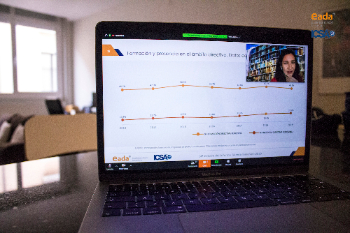14th annual report on Female talent 2020 by EADA and ICSA Grupo
 Women are still finding themselves at a disadvantage compared to men in terms of quota of management positions and remuneration, as revealed by the 14th edition of the Female talent 2020 report: Salary differences and quota of female presence, by EADA Business School and ICSA Grupo. The study was compiled from a sample of salary data from over 80,000 employed workers in Spain, using direct surveys and online platforms.
Women are still finding themselves at a disadvantage compared to men in terms of quota of management positions and remuneration, as revealed by the 14th edition of the Female talent 2020 report: Salary differences and quota of female presence, by EADA Business School and ICSA Grupo. The study was compiled from a sample of salary data from over 80,000 employed workers in Spain, using direct surveys and online platforms.
The first finding of the report indicates that only 16.4% of management positions in Spain are held by women. Despite this being the highest percentage since 2008, when it stood at 19.5%, progress is still very slow. According to the study, only 8.7% of CEOs in Spain are women. In functional areas, female presence is highest in Human Resources (32.5%), followed by Financial Management (19.6%). The quota of female presence also depends on the type of company: there is a higher presence of female managers in smaller companies (9.66%) compared to medium (5.17%) and larger companies (1.57%).
The report also highlights that the highest percentage of women can be found in the worker category (41.4%), followed by middle management (27.5%).
Gender pay gap
The report also found that the gender pay gap persists across all professional categories and is most evident in senior management positions: the current average gross annual salary for male senior managers is 85,985 euros compared to that of 74,199 euros for their female counterparts, which represents a difference of 15.9%. Salary differences are also reported in middle management roles where men earn 43,789 euros a year and women 39,524 euros (a difference of 10.8%). For employed workers, this figure stands at 25,470 euros for men and 22,768 for women (11.9%).
According to ICSA partner and lead author of the report, Indry Canchila, “these findings show that there is a masculinisation of higher paid jobs which has not been curbed during the economic recovery of recent years”. In her opinion, “this pay gap has become a serious and worrying issue during the current Covid-19 crisis because women have less savings capacity and are therefore more vulnerable”.
 Dr. Aline Masuda, professor at EADA Business School and report author, agrees that “crises always put women at a disadvantage. During the lockdown period, women have spent the most time taking care of the home, schooling and the family, sacrificing if necessary, their work time”. According to Masuda, the teleworking method adopted by many companies during confinement is not ideal as it does not provide for either work-life balance, protocols for working hours or tracking of work done. It is enforced teleworking which puts women at a further disadvantage”.
Dr. Aline Masuda, professor at EADA Business School and report author, agrees that “crises always put women at a disadvantage. During the lockdown period, women have spent the most time taking care of the home, schooling and the family, sacrificing if necessary, their work time”. According to Masuda, the teleworking method adopted by many companies during confinement is not ideal as it does not provide for either work-life balance, protocols for working hours or tracking of work done. It is enforced teleworking which puts women at a further disadvantage”.
To counter this trend, both Canchila and Masuda are demanding companies and the government “to redesign the compensation model to make it fairer, more equitable, more transparent and better adapted to individual needs”. An example would be to introduce an equal pay law as in Germany, where companies are obliged to publish the salaries of their employees. Another option would be to promote flexible retribution measures such as platforms for discounts and social benefits, telemedicine and telework, psychological support, flexibility and work-life balance. In Masuda’s opinion, “the crisis provoked by Covid-19 should force a rethink of the management model and work organisation. It is an opportunity to bring about changes that will allow women to participate in taking strategic decisions”.
